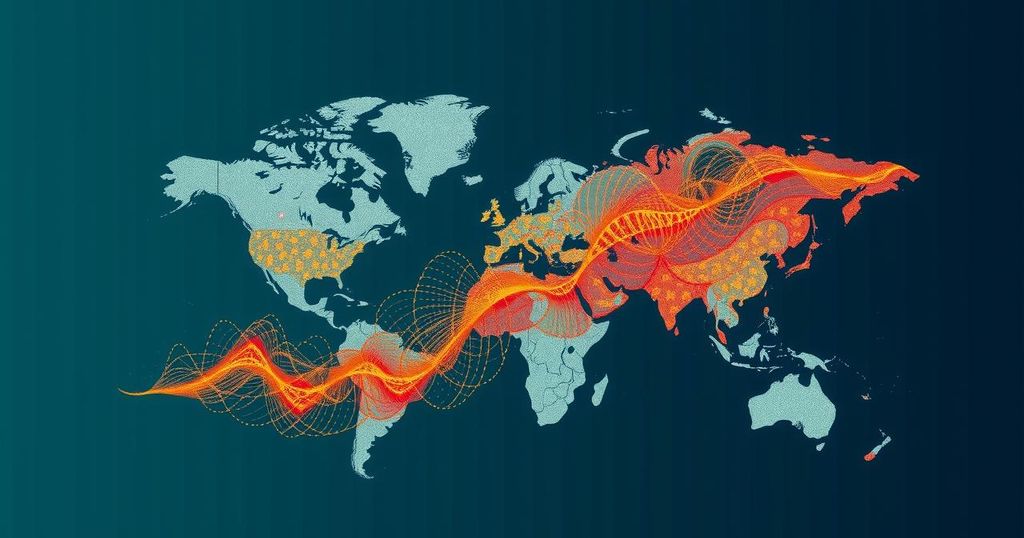COP29 Conference Highlights Climate Finance Challenges Amid Geopolitical Shifts

The COP29 climate conference revealed a critical evolution in climate finance with a pledged commitment of $300 billion annually from wealthy nations, but developing countries deemed it insufficient. Political challenges in key nations and calls for transparent funding highlight the urgent need for substantial financial support to address the climate crisis, especially for developing nations disproportionately affected by climate change.
Climate finance is experiencing a notable transformation, evidenced by the recent COP29 climate conference and the ensuing discussions surrounding financial commitments from affluent nations. During the conference held in Baku, the pledge of $300 billion per year by rich countries faced criticism from developing nations, which deemed the figure inadequate given their pressing needs stemming from climate change. Furthermore, this conference occurred against a backdrop of significant political shifts and challenges in Western nations, such as the election of Donald Trump in the United States, who has shown skepticism towards climate action.
Several countries, including Germany, Canada, and Australia, are approaching elections where conservative candidates who are generally less supportive of green policies are likely to gain traction. Conversely, the Labour government in the United Kingdom is prioritizing climate issues. At COP29, Germany and the European Union asserted their roles as advocates for climate action while emphasizing a pragmatic outlook regarding funding responsibilities for historical polluters.
European Climate Commissioner Wopke Hoekstra expressed that the current geopolitical landscape necessitates a realistic approach to climate finance, commending COP29 for heralding a new era in this domain. Moreover, German Foreign Minister Annalena Baerbock stressed the importance of providing funding flexibly, while special advisor Avinash Persaud highlighted the significance of the final deal as a reflection of what is politically feasible in developed nations while addressing the necessity of aid in developing countries.
Climate advocates argue that financial support from developed countries is an obligation rather than an option, given their historical contributions to greenhouse gas emissions that have exacerbated the situation for poorer nations. Despite the rising expectations for climate finance, the commitment to provide $300 billion by 2035 has been criticized as inadequate in light of the estimated annual requirement of $1.3 trillion. Activists, including Mariana Paoli from Christian Aid, have referred to the commitment as potentially misleading, emphasizing the need for transparency in the funding’s origin and nature, whether from public funds or loans.
The Baku agreement allows for the inclusion of climate finance from multinational financial institutions toward the $300 billion goal, raising questions over the voluntary nature of this inclusion and its implications for countries like China. In a collaborative statement, major international banks, led by the World Bank, projected their capacity to provide substantial financial resources for climate initiatives. Melanie Robinson from the World Resources Institute affirmed the value of such institutions in maximizing financial impacts and initiating a broader shift in the financial landscape to better address climate concerns.
The landscape of climate finance is rapidly evolving, particularly in light of recent geopolitical shifts and economic pressures faced by wealthy nations. The COP29 climate conference, where a commitment of $300 billion annually in climate funding was made, reflects ongoing tension between developed and developing nations regarding climate responsibilities. The evolving political landscape in key countries poses additional challenges to climate initiatives, particularly as conservative parties emerge in nations traditionally supportive of climate action. Persistent calls from activists underline the moral obligation of affluent nations to provide substantial funding to combat the climate crisis, highlighting the critical need for both transparency and efficiency in resource allocation.
In summary, the discussions at COP29 underline a significant shift in climate finance, with developing nations expressing dissatisfaction over the proposed $300 billion annually from wealthier countries. This commitment is seen as a step forward, yet still insufficient compared to the $1.3 trillion required yearly. Key stakeholders advocate for transparent, effective funding strategies and the involvement of multinational banks, recognizing the urgency for richer nations to fulfill their financial commitments as responsible parties in the global fight against climate change. The success of future climate initiatives will depend on both political will and the innovative restructuring of financial systems to equitably support climate adaptation and mitigation efforts worldwide.
Original Source: www.fox28spokane.com






